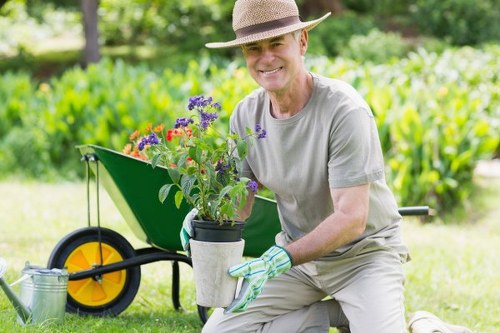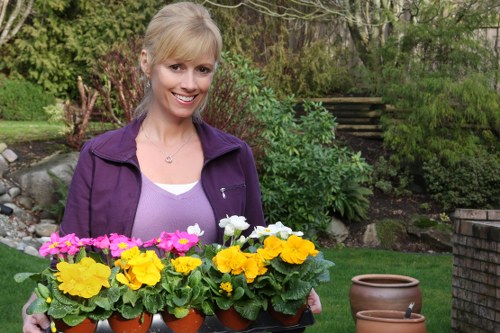Comprehensive Guide to Garden Maintenance in Cleaners E11

Maintaining a beautiful garden in Cleaners E11 requires a blend of passion, knowledge, and the right techniques. Whether you're a seasoned gardener or a beginner, understanding the unique challenges and opportunities of your local environment is crucial for achieving a flourishing outdoor space.
Cleaners E11, located in the heart of [Location], offers a diverse climate that supports a variety of plant species. Proper garden maintenance not only enhances the aesthetic appeal but also contributes to the overall health of your plants and the environment.
In this guide, we'll explore essential garden maintenance practices tailored specifically for Cleaners E11. From soil preparation to pest control, each aspect is designed to help you cultivate a vibrant and sustainable garden.

Understanding the Local Climate
The climate in Cleaners E11 plays a significant role in determining the types of plants that will thrive in your garden. With mild winters and warm summers, selecting plants that can withstand these conditions is essential.
Key Climate Factors:
- Average Temperature: Understanding the temperature ranges helps in selecting heat-tolerant or frost-resistant plants.
- Rainfall Patterns: Knowing the rainfall distribution ensures proper irrigation planning.
- Sunlight Exposure: Identifying areas with full sun, partial shade, or full shade aids in plant placement.
By aligning your plant selections with the local climate, you can reduce maintenance efforts and promote healthier growth.

Soil Preparation and Fertility
Healthy soil is the foundation of any successful garden. In Cleaners E11, preparing the soil involves understanding its composition and making necessary amendments to enhance fertility.
Testing Soil Quality
Before planting, conduct a soil test to determine pH levels, nutrient content, and soil texture. This information guides the addition of fertilizers and soil conditioners.
Improving Soil Structure
Incorporate organic matter such as compost or well-rotted manure to improve soil structure. This enhances water retention, drainage, and aeration.
pH Adjustment
Adjust the soil pH based on test results. Most plants prefer a slightly acidic to neutral pH (6.0-7.0), but some may require more specific conditions.
Pro Tip: Regularly adding organic matter not only nourishes plants but also supports beneficial soil microorganisms.
Note: Avoid over-fertilizing, as excessive nutrients can harm plant roots and lead to environmental runoff.

Plant Selection and Placement
Choosing the right plants is crucial for a low-maintenance and resilient garden in Cleaners E11. Consider native species that are adapted to the local climate and require less water and care.
Benefits of Native Plants:
- Adapted to local pests and diseases.
- Require less water and fertilizer.
- Support local wildlife and pollinators.
Strategically placing plants based on their sunlight and water needs ensures optimal growth and minimizes maintenance efforts.
For example, position sun-loving plants in areas with full sunlight and shade-tolerant varieties under trees or in partially shaded spots.

Regular Maintenance Practices
Consistent maintenance is key to keeping your garden in top shape. Here are some essential practices to incorporate into your gardening routine:
Pruning and Trimming
Regular pruning helps maintain plant health, encourages new growth, and enhances the overall appearance of your garden.
- Remove dead or diseased branches.
- Shape shrubs and trees for a tidy look.
- Thin out dense foliage to improve air circulation.
Always use clean and sharp tools to make precise cuts, minimizing stress to the plants.
Weeding
Weeds compete with your garden plants for nutrients, water, and light. Regular weeding prevents their spread and reduces the risk of infestation.
Effective Weeding Tips:
- Remove weeds while they are young to prevent seed formation.
- Use mulch to suppress weed growth.
- Employ hand-pulling or appropriate tools for removal.
Maintaining a weed-free garden contributes to the overall health and aesthetics of your outdoor space.

Irrigation and Water Management
Proper watering is vital for plant health, especially during dry spells. In Cleaners E11, managing water efficiently ensures that your garden remains lush without wasting resources.
Watering Techniques:
- Drip Irrigation: Delivers water directly to the plant roots, reducing evaporation and runoff.
- Soaker Hoses: Provide even moisture distribution along rows of plants.
- Rainwater Harvesting: Collects and stores rainwater for garden use, promoting sustainability.
Implementing these methods not only conserves water but also promotes healthier plant growth by ensuring consistent moisture levels.
Mulching:
Applying mulch around plants helps retain soil moisture, regulate temperature, and suppress weed growth. Organic mulches like bark or straw also decompose over time, enriching the soil.

Pest and Disease Management
Protecting your garden from pests and diseases is essential for maintaining plant health. Integrated Pest Management (IPM) offers a balanced approach to controlling unwanted visitors.
Identifying Common Pests
Familiarize yourself with the common pests in Cleaners E11, such as aphids, slugs, and caterpillars. Early detection allows for timely intervention.
Natural Remedies
Employ natural predators like ladybugs and birds to control pest populations. Additionally, use organic pesticides that are safe for beneficial insects.
Disease Prevention
Maintain good garden hygiene by removing diseased plant material and ensuring proper air circulation around plants. Rotate crops annually to prevent soil-borne diseases.
Tip: Regularly inspect plants for signs of stress or damage to address issues promptly.

Seasonal Maintenance Tasks
Each season brings its own set of maintenance requirements. Adapting your care routine to the changing weather ensures year-round garden health.
Spring
Prepare your garden for the growing season by cleaning beds, planting new specimens, and applying fertilizers to boost plant growth.
Summer
Focus on watering, weeding, and monitoring for pests. Provide adequate shade and support for plants exposed to intense sunlight.
Autumn
Harvest remaining produce, prune perennials, and protect sensitive plants from the upcoming cold. Incorporate compost to enrich the soil for the next planting season.
Winter
While growth slows, maintain garden tools, plan for the next year, and protect plants from frost with mulches or coverings.
Adapting your maintenance practices to each season helps sustain a robust and vibrant garden throughout the year.

Garden Tools and Equipment
Investing in the right tools can make garden maintenance more efficient and enjoyable. Equip yourself with essential tools tailored to Cleaners E11's gardening needs.
Must-Have Tools:
- Hand Trowel: Ideal for planting and transplanting.
- Pruning Shears: Essential for trimming and shaping plants.
- Garden Fork: Useful for aerating soil and removing weeds.
- Hose and Sprinklers: For efficient watering.
- Wheelbarrow: Facilitates the movement of soil, plants, and debris.
Regular maintenance and proper storage of your garden tools extend their lifespan and performance.
Safety First:
Always wear protective gear such as gloves and eyewear when handling tools to prevent injuries.

Creating a Sustainable Garden
A sustainable garden not only benefits your immediate environment but also contributes to the broader ecosystem. Implement eco-friendly practices to enhance sustainability in Cleaners E11.
Composting
Recycling organic waste through composting enriches the soil and reduces landfill waste. Set up a compost bin to turn kitchen scraps and garden waste into valuable fertilizer.
Water Conservation
Utilize water-saving techniques such as mulching, drip irrigation, and rainwater harvesting to minimize water usage.
Native and Drought-Resistant Plants
Incorporate plants that require less water and are adapted to the local climate, reducing the need for frequent watering.
Wildlife-Friendly Practices:
- Provide habitats for beneficial insects and birds.
- Use non-toxic pest control methods.
- Plant a variety of species to support biodiversity.

Professional Garden Maintenance Services
While DIY gardening offers satisfaction, professional garden maintenance services in Cleaners E11 can provide expertise and save you time. Professionals bring experience and specialized knowledge to handle complex tasks effectively.
Benefits of Hiring Professionals:
- Comprehensive garden assessments and tailored maintenance plans.
- Expert pest and disease management.
- Efficient and timely execution of maintenance tasks.
If you're overwhelmed with garden upkeep or seeking to elevate your garden's appearance, consider reaching out to local garden maintenance specialists.
Call to Action: Contact us today to schedule a consultation and transform your garden into a thriving oasis.


